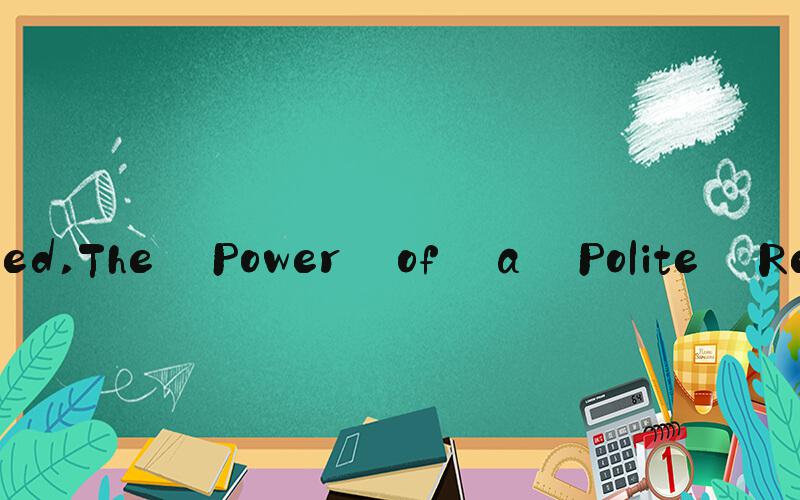
 Refused: How Saying No Can be Empowering and Productive
Refused: How Saying No Can be Empowering and ProductiveAs human beings, we are wired to be social creatures. We want to be liked and respected by others, and we often find it difficult to say no when someone asks us for a favor or invitation. However, learning to say no can be a powerful tool in our personal and professional lives, allowing us to stay focused on our own priorities and goals.
The Power of a Polite RefusalThe idea of refusing someone can be challenging, but it does not have to be accompanied by rudeness or aggression. Saying no can be done with politeness and respect. Using statements such as "Thank you for the invitation, but I need to decline," or "I appreciate your request, but I am unable to fulfill it at this time," can be simple ways to decline a request while still maintaining a good relationship with the person or group.
Being polite in refusal can actually build positive relationships and increase mutual respect among both parties. It provides clarity, honesty, and demonstrates that your time is valuable and deserving of respect. When we say no with clarity and grace, it opens up the opportunity for productive conversations about how we can work together, rather than creating tension and negativity.
The Benefits of Saying NoIt is essential to recognize that saying no does not necessarily mean that you are not being a helpful person or that you are not being a team player. Sometimes, saying no can lead to more productivity and fulfillment in our personal and work lives. When we say no, we give ourselves the opportunity to focus on what is essential and give our best effort to the things that matter the most to us.
Saying no can also lead to the development of a more precise understanding of our interests and strengths. It allows us to establish our boundaries and make ourselves more self-aware of our strengths, weaknesses, and limitations. This self-awareness helps us to know what we can take on and what might be stretching us too thin. It provides us with the time and space to reflect on our priorities and making choices that align them with our goals.
The Risks of Not Saying NoNot saying no can have disastrous consequences, leading to burnout, resentment, and a lack of fulfillment in our personal and professional lives. When we always say yes, we can lose sight of our priorities and overlook the things that matter most to us. We become overly committed and unable to bring our best effort to the things that are most important. It can lead to missed deadlines, disappointing results, and ultimately, a lack of satisfaction and joy in our lives.
We can also become resentful when we say yes to things that we do not want to do. We may end up feeling manipulated or taken for granted. Resentment wears down on us, leading to decreased productivity and effectiveness.
ConclusionSaying no may seem daunting at first, but it can be a beneficial tool for productivity and personal growth. It can help us establish healthy boundaries, gain self-awareness, and have a clearer focus on our goals and priorities. Remember, it is essential to maintain the importance of politeness and respect when saying no. It can lead to more positive relationships and prevent harmful resentment. Lastly, saying no does not mean that you are not a helpful or productive person. It solely means that you know your limits and want to bring your best effort to the things that matter most to you.
